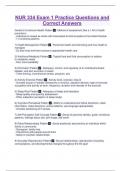NUR 334 Exam 1 Practice Questions and
Correct Answers
Gordon's Functional Health Pattern✅- Method of assessment (like a 1-40 of health
promotion)
- Individual is viewed as whole with interrelated functional patterns that reflect lifestyle
- 11 functional patterns
1) Health Management Pattern✅- Perceived health and well-being and how health is
managed
- Do they trust and have access to appropriate health care
2) Nutritional-Metabolic Pattern✅- Typical food and fluid consumption in relation
to metabolic needs
- Diet, food availability
3) Elimination Pattern✅- Adequacy, control, and regularity of an individual's bowel,
bladder, and skin excretion of waste
- Toilet training, incontinence (stress, pressure, etc)
4) Activity-Exercise Pattern✅- Activity level, exercise, leisure
- Includes issues of mobility (temporary or chronic), assistive devices, type of exercise,
occupation and activity at work, frequency, duration and intensity of the exercise
5) Sleep-Rest Pattern✅- Adequacy of sleep and relaxation
- Sleep quality and quantity assessment
- Often subjective (exception of sleep study)
6) Cognitive-Perceptual Pattern✅- Ability to understand and follow directions, retain
information, make decisions, solve problems, use language appropriately
- Includes assessing all 5 senses
7) Self-Perception-Self-Concept Pattern✅- Sense of personal identity, goals, emotional
patterns, feelings about self, self-image, self-worth
8) Roles-Relationships Pattern✅- Social position(s) assumed by an individual within
family or community
- Genogram, family tree
- Interactions with people around them
- Ability to maintain relationships
9) Sexuality-Reproductive Pattern✅- Sexual relationships, reproduction (including
contraception), and developmental changes throughout the life span
, - Psychological and cultural aspects as well
10) Coping-Stress Tolerance Pattern✅- General coping and ability to effectively
manage stress
- Need to be assessing stress on the daily. It can change rapidly
- Support systems and relationships
11) Values-Belief Pattern✅- Individual or collective values, beliefs, and goals
- Children often gets these from their parents
- As they move towards adulthood and get out on their own, start forming these for
themselves
Approaches to Family Nursing Practice✅- Family as context - individual as foreground,
family as background
- Family as client - family as foreground, individual as background
- Family as system - interactional system
- Family as component of society - legal, education, health, social, financial, religion,
family
Family Systems Theory✅- Views family as a living, open system, where change in one
member changes the system
- Stability is maintained by adaptation to internal and external stresses created by
change
- Views the individual as a participant in a family whole
Family Developmental and Life Cycle Perspective✅- Describes families in terms of the
normal predicted stresses that families experience as they change and transition over
time, *based on the age of the eldest child*
Risk-Factor Perspective✅- Understands family health based on risk-factors (lifestyle,
biological, environmental, sociocultural, and health care system)
Types of Families✅- Nuclear (traditional mom and dad)
- Single-Parent
- Cross-Generational
- Adoptive/Foster
- Never-Married
- Blended Families
- Grandparents as Parents
- Same-Sex Parent
Determinants of Health and Health Behavior✅- Factors that explain individual variation
in health or health behavior
* Direct: those determinants that are found in literature
* Indirect: not specifically quantified in research




